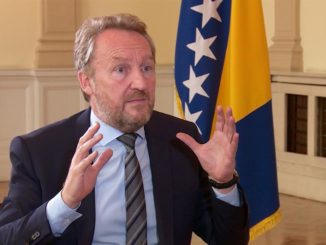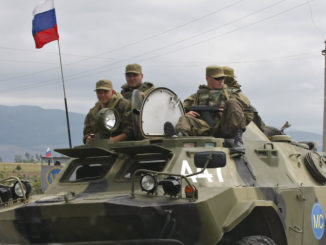Balkan countries are increasing co-operation in response to the developments in Ukraine as experts have warned of security implications of separatist tendencies.
Examples of a re-energised co-operative spirit can be found in several countries, including Serbia, Croatia, Kosovo, Albania and Macedonia.
The renewed efforts come as Paddy Ashdown, former High Representative in Bosnia and Herzegovina (BiH), warned that interference by Moscow following its intervention in Crimea could lead to additional problems in BiH.
Republika Srpska President Milorad Dodik visited Moscow this month to hear a proposal that RS borrow money from Moscow rather than participating in a proposed IMF loan with the rest of BiH.
“Some Bosnian politicians are playing the Moscow card, even, most dangerously of all, the Slav card, in support of policies of separation,” Ashdown told a NATO seminar on southeast Europe in the Bosnian capital Sarajevo.
“Europe and the West must now act decisively to close down this new salient of division in this country,” he said.
The Ukraine Embassy in Sarajevo criticised the president’s statements, noting that Dodik is not responsible for foreign policy.
“Such statements are creating an openly hostile atmosphere towards Ukraine and completely contradict the marks that the entire international community gave on the Crimean referendum. It is also crucial to bear in mind that any support of violations of international law, aggression and separatism can have a strong negative impact on peace and stability in the Balkans,” Oleksandr Oborskyj, the chief of the diplomatic mission of Ukraine in BiH, told SETimes.
While the Serbian portion of BiH entertains overtures from Moscow, Serbia said it is ready to assist regional countries, especially BiH, in their Euro-Atlantic integration.
“BiH’s stability, prosperity and successful European path are very important to Serbia,” said Stanimir Vukicevic, Serbia’s ambassador to BiH.
Vukicevic said only when the regional countries become part of the EU can prejudices that threaten security be fully overcome.
Albania’s Foreign Minister Ditmir Bushati visited Zagreb last Friday (March 21st) to discuss increased energy and infrastructure co-operation. The two countries signed a European Partnership agreement, whereby Croatia pledged it will support Albania’s EU membership bid.
The two countries are undertaking a host of joint projects such as the development of the Adriatic-Ionian corridor.
“This will create a new reality in the region,” Bushati said.
Both countries also agreed to support the EU-mediated Belgrade-Pristina dialogue to strengthen regional peace and security.
The Balkan countries understood there is a need to review their security and competitiveness because of the Crimea crisis, said Enri Hide, a lecturer at the European University of Tirana.
“[That is because] the regional countries are small and consequently more exposed to the sudden changes of the regional or global security architecture,” Hide told SETimes.
Albania is also working closer with Kosovo as both countries proclaimed they want to be promoters of the region’s Europeanisation.
“Such co-operation is strategic for us, stabilising for the region and orientating for all on the Euro-Atlantic path,” Bushati said during his visit to Pristina on March 14th.
The two countries are now in the process of concluding additional agreements to the ones already reached in the fields of energy, employment, culture and tourism, and will include joint projects in infrastructure, finance and education.
Participating in the designing of a regional and European approach to address complex security challenges — such as the Ukraine crisis — is important, said Marjan Gjurovski, professor at the Security Faculty in Skopje.
“Macedonia, has signed bilateral agreements with Albania and Kosovo that include joint military exercises and meetings of security experts. Macedonia is also making available to Kosovo its regional military training centres,” Gjurovski said.
Gjurovski said next on the list is airspace and intelligence co-operation as well as concluding joint projects to further enhance stability as well as mutual trust. (www.setimes.com)



